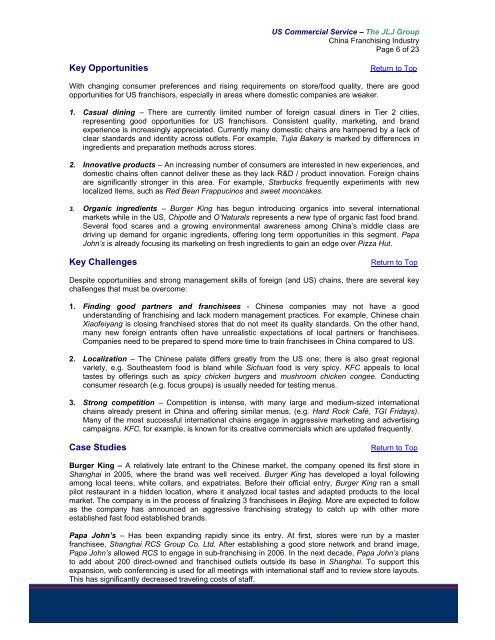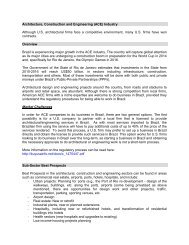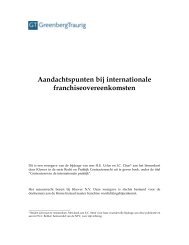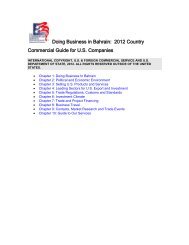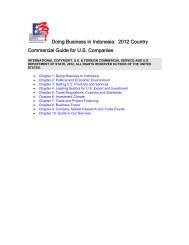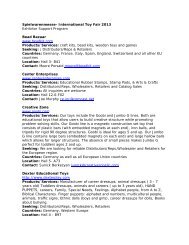CHINA: Franchising Industry - Export.gov
CHINA: Franchising Industry - Export.gov
CHINA: Franchising Industry - Export.gov
Create successful ePaper yourself
Turn your PDF publications into a flip-book with our unique Google optimized e-Paper software.
US Commercial Service – The JLJ Group<br />
China <strong>Franchising</strong> <strong>Industry</strong><br />
Page 6 of 23<br />
Key Opportunities Return to Top<br />
With changing consumer preferences and rising requirements on store/food quality, there are good<br />
opportunities for US franchisors, especially in areas where domestic companies are weaker.<br />
1. Casual dining – There are currently limited number of foreign casual diners in Tier 2 cities,<br />
representing good opportunities for US franchisors. Consistent quality, marketing, and brand<br />
experience is increasingly appreciated. Currently many domestic chains are hampered by a lack of<br />
clear standards and identity across outlets. For example, Tujia Bakery is marked by differences in<br />
ingredients and preparation methods across stores.<br />
2. Innovative products – An increasing number of consumers are interested in new experiences, and<br />
domestic chains often cannot deliver these as they lack R&D / product innovation. Foreign chains<br />
are significantly stronger in this area. For example, Starbucks frequently experiments with new<br />
localized items, such as Red Bean Frappucinos and sweet mooncakes.<br />
3. Organic ingredients – Burger King has begun introducing organics into several international<br />
markets while in the US, Chipotle and O’Naturals represents a new type of organic fast food brand.<br />
Several food scares and a growing environmental awareness among China’s middle class are<br />
driving up demand for organic ingredients, offering long term opportunities in this segment. Papa<br />
John’s is already focusing its marketing on fresh ingredients to gain an edge over Pizza Hut.<br />
Key Challenges Return to Top<br />
Despite opportunities and strong management skills of foreign (and US) chains, there are several key<br />
challenges that must be overcome:<br />
1. Finding good partners and franchisees - Chinese companies may not have a good<br />
understanding of franchising and lack modern management practices. For example, Chinese chain<br />
Xiaofeiyang is closing franchised stores that do not meet its quality standards. On the other hand,<br />
many new foreign entrants often have unrealistic expectations of local partners or franchisees.<br />
Companies need to be prepared to spend more time to train franchisees in China compared to US.<br />
2. Localization – The Chinese palate differs greatly from the US one; there is also great regional<br />
variety, e.g. Southeastern food is bland while Sichuan food is very spicy. KFC appeals to local<br />
tastes by offerings such as spicy chicken burgers and mushroom chicken congee. Conducting<br />
consumer research (e.g. focus groups) is usually needed for testing menus.<br />
3. Strong competition – Competition is intense, with many large and medium-sized international<br />
chains already present in China and offering similar menus, (e.g. Hard Rock Café, TGI Fridays).<br />
Many of the most successful international chains engage in aggressive marketing and advertising<br />
campaigns. KFC, for example, is known for its creative commercials which are updated frequently.<br />
Case Studies Return to Top<br />
Burger King – A relatively late entrant to the Chinese market, the company opened its first store in<br />
Shanghai in 2005, where the brand was well received. Burger King has developed a loyal following<br />
among local teens, white collars, and expatriates. Before their official entry, Burger King ran a small<br />
pilot restaurant in a hidden location, where it analyzed local tastes and adapted products to the local<br />
market. The company is in the process of finalizing 3 franchisees in Beijing. More are expected to follow<br />
as the company has announced an aggressive franchising strategy to catch up with other more<br />
established fast food established brands.<br />
Papa John’s – Has been expanding rapidly since its entry. At first, stores were run by a master<br />
franchisee, Shanghai RCS Group Co. Ltd. After establishing a good store network and brand image,<br />
Papa John’s allowed RCS to engage in sub-franchising in 2006. In the next decade, Papa John’s plans<br />
to add about 200 direct-owned and franchised outlets outside its base in Shanghai. To support this<br />
expansion, web conferencing is used for all meetings with international staff and to review store layouts.<br />
This has significantly decreased traveling costs of staff.


